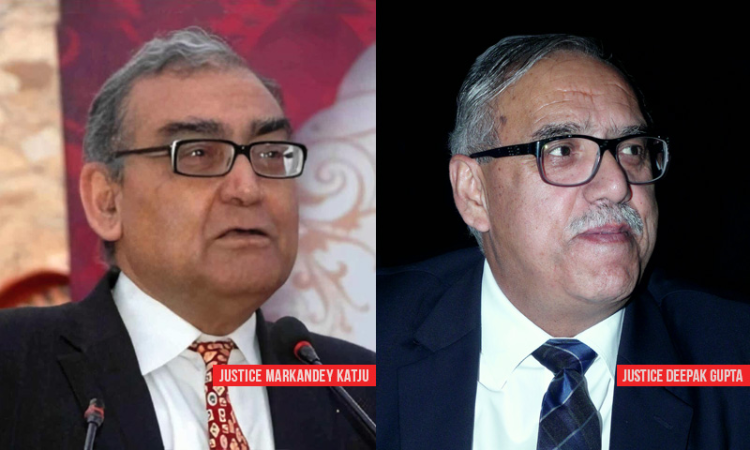The Scales of Justice Should Be Tilted In Favour Of The Poor
Justice Markandey Katju, Former SC Judge
11 May 2020 10:53 AM IST

Justice Deepak Gupta who retired from the Supreme Court recently in his farewell speech lamented that the Indian judicial system today favours the rich, and is weighted against the poor, when a real judicial system should be the other way around, and should be weighted in favour of the poor, because it is the poor who need protection.
In this connection I may refer to a historical incident narrated in the Rajtarangani, the famous 12th Century Sanskrit treatise by the Kashmiri historian Kalhan, showing how a Kashmiri King, Chandrapida, upheld the Rule of Law, and protected a charmakar ( cobbler ) against his own officials.
The King's officials had planned to build a temple of Lord Tribhuvanaswamy on a land, on a piece of which the cobbler's hut was situated. The cobbler refused to remove his hut despite the orders of the officials.
When the officials complained of the cobbler's obstinacy to the King, instead of ordering demolition of the hut, the King severely reprimanded the officials for trying to encroach on the cobbler's land.
The King told them :
नियम्यताम् विनिर्माणं यद् अन्यत्र विधीयताम्
परभूमि अपहरण सुकृतं कः कलंकेत
ये द्रष्टारः सदसताम् ते धर्म विनुगणा क्रियाः
वयमेव विदधमश्चेत यातु न्यायेण को अघ्वना
i.e.
" Stop the construction, or build the temple elsewhere
Who would tarnish such a pious act ( of building a temple ) by illegally depriving a man of his land ?
If we, who are the judges of what is right and what is not, act unlawfully, who would then abide by the law ? "
( Rajtarangini, chapter 4, pages 59-60 )
Later, overwhelmed by the sense of justice of the King, the cobbler sought an audience with him.
When brought before the King he said :
" Just as the palace is to Your Majesty, so is the hut to me. I could not bear its demolition.However, if Your Majesty asks for it, I shall give it up, seeing your just behaviour "
Subsequently the King purchased it after paying a satisfactory price.
The cobbler then told the King with folded hands :
राजधर्म अनुरोधेन पर्वत्ता तयोचिता
स्वस्ति तुभ्यं चिरं स्थेया धर्म्या वृत्तांत पद्धति
दर्शयन् ईदृशीह श्रद्धा श्रद्धेया धर्मचारिणाम
i.e.
" Yielding to another, however low, adhering to the principles of Rajdharma,is the appropriate course for a King. I wish you well.
May you live long, upholding the supremacy of the law."
( Rajtarangini Chapter 4, pp.75-77 )
Thus, under a just King the supremacy of the law was upheld, and the weak ( the cobbler ) prevailed over the strong ( the King's officials ).
Perhaps King Chandrapida illustrates what Justice Deepak Gupta had in mind, and what a true judge should be like.
Views are personal
Author is a former Judge of Supreme Court of India


